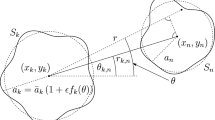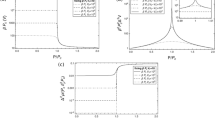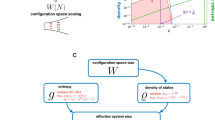Abstract
THE report of a discussion on this subject1 prompts me to publish a simple equation which I obtained some time ago for the water vapour pressure isotherm of sulphuric acid solutions. Sulphuric acid is the only liquid that gives heats of mixing with water which are comparable with the heat of wetting of wool, and because the solution is free from mechanical restraint, I set out to determine how far the solution deviated from the regular solution formula2.
This is a preview of subscription content, access via your institution
Access options
Subscribe to this journal
Receive 51 print issues and online access
$199.00 per year
only $3.90 per issue
Buy this article
- Purchase on Springer Link
- Instant access to full article PDF
Prices may be subject to local taxes which are calculated during checkout
Similar content being viewed by others
References
Nature, 167, 12 (1951).
Fowler and Guggenheim, “Statistical Thermodynamics”, 357 (Cambridge, 1939).
Kolloidchem. Beihefte, 9, 124 (1918).
J. Amer. Chem. Soc., 43, 704 (1921).
Author information
Authors and Affiliations
Rights and permissions
About this article
Cite this article
CASSIE, A. Statistical Theory of Solutions. Nature 168, 382 (1951). https://doi.org/10.1038/168382a0
Published:
Issue Date:
DOI: https://doi.org/10.1038/168382a0
Comments
By submitting a comment you agree to abide by our Terms and Community Guidelines. If you find something abusive or that does not comply with our terms or guidelines please flag it as inappropriate.



